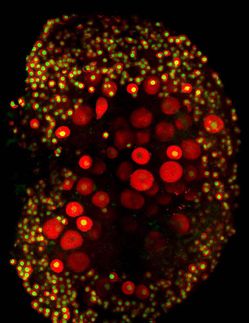Baylor College of Medicine Uses SEQUENOM's MassARRAY(R) System to Develop Improved Genetic Testing for Cystic Fibrosis
Advertisement
SEQUENOM, Inc. reported that clinicians at the Baylor College of medicine have published the successful implementation of the MassARRAY(R) system for high-throughput CFTR testing. The publication in the September/October 2004 issue of genetics IN Medicine also reports the discovery of a new disease causing polymorphism. The extended CFTR assay panel developed for use on SEQUENOM's MassARRAY system covers 51 mutations. Most importantly, results from the Baylor DNA Laboratory established the clinical significance of a rare CF mutation and contributed to recently revised CF testing recommendations by the American College of Medical Genetics.
The panel and MassARRAY system were validated with over 1,000 patient samples. In comparison to a laboratory standard, the ASO hybridization assay system, the MassARRAY system delivered complete concordance and enabled more detailed sample characterization in two cases. As a result, MassARRAY technology and the 51 mutation panel were implemented for routine CF clinical testing in the laboratory, and more than 5,000 patient samples have been tested.
"We are pleased that our MassARRAY system is part of this important genetic testing effort. These data demonstrate that the MassARRAY system delivers exemplary DNA analysis data for clinical research and clinical practice," said Toni Schuh, Ph.D., President and CEO of SEQUENOM. "We believe that this is an excellent example of the superior performance of the MassARRAY system as a leading platform in the genetic testing market."
Headed by Dr. Benjamin Roa, the research team at the Medical Genetics Laboratories in the Department of Molecular and Human Genetics at Baylor College of Medicine developed a multiplexed 51-mutation extended CF panel that incorporates the 25 originally recommended CFTR mutations, plus 26 additional mutations, including the newly characterized 3199del6 CF mutation. The extended panel is designed to allow physicians to diagnose CF patients more accurately than previous tests.
"Using mass spectrometry adapted for DNA analysis enabled the evaluation of each patients' CF mutation status in a very sensitive and specific manner," said Benjamin Roa, Ph.D., Director, Baylor DNA Diagnostic Laboratory and Assistant Professor, Department of Molecular and Human Genetics at Baylor College of Medicine. "Several advantages of the technology we used to conduct our research include high throughput testing for patient samples and mutations, improved turn around times and flexibility in assay design. Flexibility is a key advantage given the dynamic nature of genetic testing. Our research also enabled the identification of the newly characterized 3199del6 CF mutation. Due in part to our research, the American College of Medical Genetics recently revised CF testing recommendations for more accurate CF screening."




















































